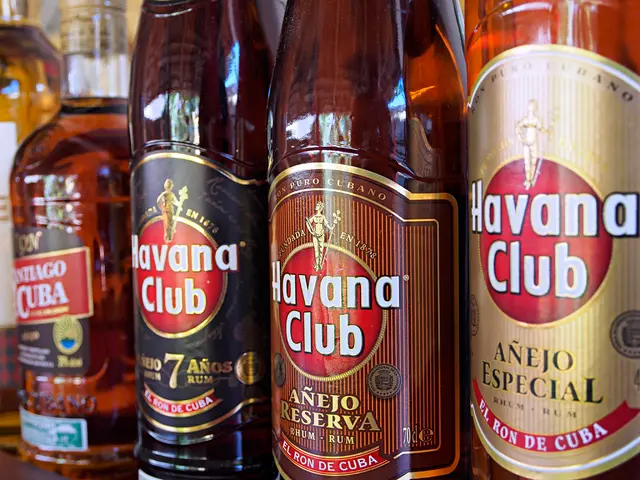Strategies for Maintaining a Healthy Gut Microbiota:
Chill, Boost Your Gut Microbiome This Holiday Season
Embrace the rapidly growing appreciation for the trillions of microbes sharing your bodily space this festive season, and follow these tips to keep those microscopic pals happy and healthy.
Gone are the days when we viewed the multitude of microorganisms colonizing our bodies as mere hitchhikers. Today, we recognize that our gut microbiota plays a pivotal role in our well-being. The holiday season can be a challenging time for maintaining this delicate balance, so let's dive into some strategies to ensure our tiny partners-in-crime stay in tip-top shape.
Research published in the journal Cell, led by Dr. Sven Pettersson (a professor of metabolic disorders at the Lee Kong Chian School of Medicine in the Nanyang Technological University in Singapore), reveals that our gut microbiome naturally evolves throughout our lives. Beginning as a simple collection of a handful of bacteria, it matures into a complex microbial ecosystem impacted by factors such as diet, lifestyle, hormones, and immune system.
Imbalances in our gut flora are linked to a steady rise in various conditions, including food allergies, eczema, asthma, autism spectrum disorders, chronic fatigue syndrome, irritable bowel syndrome, and even cancer. To assist you in navigating the holidays, we've got a few guidelines to help keep your gut microbes contented during the season of calorific excesses.
1. Fiber is Your Friend
Although we can't digest fiber ourselves, it serves as a crucial food source for our microbial companions. If there isn't enough fiber in our diet, microbes start to consume the mucus barrier in the gut as an alternative. This opens up the gut barrier, allowing microorganisms to cross and wreak havoc, potentially leading to conditions like colitis, inflammation, and metabolic syndrome.
Research published in the journal Cell Host & Microbe indicates that even short-term shifts to a Western-style diet – characterized by low fiber – result in leaky gut symptoms, weight gain, high blood sugar, and insulin resistance, along with widespread bacterial death in the gut in favor of harmful species such as Bacteroides and Actinobacteria.
"Diets that lack fiber," explains Gunnar C. Hansson, a professor in the Department of Medical Biochemistry at the University of Gothenburg in Sweden and co-author on the study, "alter the bacterial composition and metabolism, causing defects to the inner mucus layer and allowing bacteria to encroach, which triggers inflammation and ultimately metabolic disease."
Prof. Hansson and colleagues discovered that bacteria that degrade fiber, such as Bifidobacterium, were greatly reduced on the Western-style diet. However, they also showed that adding Bifidobacterium or inulin – a type of prebiotic plant fiber – to the mice's diet could improve gut health.
Inulin supplementation, as demonstrated in a study led by Andrew Gewirtz, a professor at the Center for Inflammation, Immunity & Infection at Georgia State University in Atlanta, has the potential to restore gut health and reduce signs of metabolic syndrome to some extent. While it's too soon to fully endorse inulin supplementation, remember that a balanced diet rich in fiber-based foods may provide the best approach for supporting gut health.
Before you run out to stock up on inulin, keep in mind that simply enriching processed food with purified fibers may only offer limited health benefits until the complex interplay between food, bacteria, and the host is better understood.
Instead, opt for holiday foods that naturally pack a fiber punch. You'll find recommendations for fiber-rich holiday foods in the American Heart Association's (AHA) .
2. Give Your Gut a Chocolate Treat
Cocoa – the dry, non-fatty component of chocolate – contains a host of beneficial molecules. Rich in antioxidants and fiber, cocoa has been linked to various health benefits, from lowering cholesterol levels to promoting fetal development during pregnancy.
Cocoa consumption has also been shown to reduce inflammation, potentially alleviating symptoms of inflammatory bowel diseases (IBD) such as Crohn's and ulcerative colitis. Earlier this year, research revealed that cocoa components can reduce bacteria in the Clostridium family, often found in the guts of those with IBD. When human study subjects drank high-cocoa chocolate milk over a period of 4 weeks, Lactobacillus and Bifidobacterium species increased significantly in their guts.
While not all chocolate is created equal, unsweetened cocoa powder and dark chocolate with a high cocoa content are the closest you can get to the cocoa formulations used in scientific research. So, go ahead and indulge in a piece or two of dark chocolate during the festive season.
3. Move Your Holiday Pounds
Research presented earlier this month in Medical News Today demonstrates that exercise can directly impact the diversity of your gut microbiome for the better. A study on mice found that the exercise group had more bacteria in their colons that could metabolize fiber into short-chain fatty acids (SCFAs), beneficial compounds for health. These mice also exhibited lower levels of inflammation.
Human studies support similar findings, with just 6 weeks of exercise leading to increased SCFA levels and SCFA-producing microbes in both lean and obese individuals. However, while both groups experienced this increase, it was more pronounced in lean individuals.
So, whether you're off for a brisk walk after a big family meal or dancing around the living room to silly Christmas songs, moving your body to help your gut should be on your list of priorities.
4. Take Care of Your Mental Health
Stress can have detrimental effects on your gut microbiome, as a study led by researchers from Brigham Young University in Provo, UT, revealed. Exposure to chronic unpredictable stress led to drastic changes in the gut microbiome of female mice, with the bacterial diversity shifting in favor of species associated with high-fat diets.
While only female mice were studied in this particular research, it's safe to assume that both sexes can experience holiday stress. Managing stress levels during the holidays is essential for maintaining a healthy gut microbiome. Check out our 'How to Reduce Christmas Stress' guide for practical tips to help you navigate this tumultuous time.
With this collection of tips, your gut microbes – and, by extension, your overall health – can be well-equipped to handle the holiday season and kickstart the new year in the best way possible.
As the months unfold, expect continued research into how our microbiome shapes our health, with increasing insight into practical steps we can take to ensure optimal gut and overall health.
- Incorporate fiber-rich foods into your holiday menu to support the health of your gut microbiota, as a lack of fiber can lead to harmful bacteria consuming the mucus barrier in the gut and potentially causing conditions like colitis and inflammatory diseases.
- Indulge in dark chocolate during the festive season, as cocoa – the non-fatty component of chocolate – contains beneficial antioxidants and fiber and has been shown to reduce inflammation and potentially alleviate symptoms of inflammatory bowel diseases.
- Make fitness and exercise a priority during the holiday season, as research indicates that exercise can increase the diversity of your gut microbiome and lower levels of inflammation.
- Prioritize mental health during the holiday season, as stress can have detrimental effects on your gut microbiome. Managing stress levels is essential for maintaining a healthy gut microbiome, and our 'How to Reduce Christmas Stress' guide can provide practical tips to help navigate this challenging time.
- A balanced diet rich in fiber-based foods may provide the best approach for supporting gut health. Opt for holiday foods that naturally pack a fiber punch, and remember that simply enriching processed food with purified fibers may only offer limited health benefits until the complex interplay between food, bacteria, and the host is better understood.







